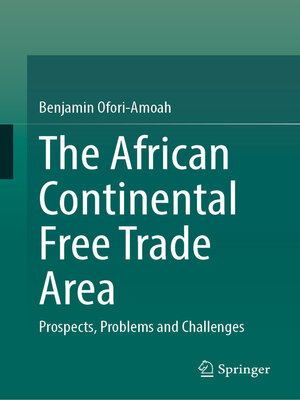The African Continental Free Trade Area
ebook ∣ Prospects, Problems and Challenges
By Benjamin Ofori-Amoah

Sign up to save your library
With an OverDrive account, you can save your favorite libraries for at-a-glance information about availability. Find out more about OverDrive accounts.
Find this title in Libby, the library reading app by OverDrive.



Search for a digital library with this title
Title found at these libraries:
| Library Name | Distance |
|---|---|
| Loading... |
In March of 2018, 44 African countries signed the African Continental Free Trade Area agreement (AfCFTA) to launch what is considered as the largest free trade area in the world. The signing of the agreement has been hailed as a major breakthrough for African development by African countries and organizations as well as external observers of African affairs. This is not the first time African countries have proposed a new organizational and institutional structure for development. African countries have signed at least 13 regional trade agreements (RTAs) for intraregional trade since 1959. However, the track record of these groups has been relatively mediocre compared to RTAs elsewhere. Thus, Africa has the lowest percentage of intracontinental trade in the world.
This volume evaluates the prospects and challenges for the AfCFTA through a deep-dive assessment of previous trade blocs on the African continent and of regional free trade areas in other parts of the world. The central question of the book is this: If pre-AfCFTA trade blocs in Africa did not encourage more intracontinental trade, what guarantees that the AfCTA will? The formation of the AfCFTA will definitely remove overlapping membership that existed with previous trading blocs on the continent, but what is different about the AfCFTA that will get rid of cumbersome regulation, boost manufacturing, and create jobs? This book argues that the dreams of AfCFTA will not be realized unless African countries make efforts to address the industry mix of their economies and to enforce the rules and regulations they set down on paper.







